
Ukraine is among the countries that attracts refugees from all over the world. While the immigrants come with diverse backgrounds and experiences, they still encounter myriad challenges as they adjust to their new lives. Today, many libraries in Ukraine provide critical support to individuals in these diverse ethnic communities with resources that help them adapt to the new environment.
The staff of Desniansk District Library Branch No. 141 in Kyiv has geared up to meet the needs of the growing multi-ethnic population in this changing neighborhood. The library joined forces with NGO Rokada to provide workshops that help refugees in the district adapt to the cultural, economic and legal environment in Ukraine.
The library's activities are the result of the Bibliomist program—a partnership between USAID, the Bill & Melinda Gates Foundation and the International Research and Exchanges Board (IREX)—which is working with libraries across Ukraine to better serve their communities through training and technology. Bibliomist is helping 1,900 libraries obtain computer technology and modernize citizens’ access to information.
Bibliomist is part of the Ukraine Global Libraries Program initiated by USAID and the Bill & Melinda Gates Foundation in November 2008 with a grant to IREX as part of the foundation’s Global Libraries Initiative. Further support for Bibliomist comes from Microsoft Corp., an initiative partner, which is donating about $9 million in software to Ukraine’s public libraries.
“Our library uses instructors from the Rokada NGO, who advise and guide our community on immigration legislation, health, employment and education as well as language classes,” says Tetyana Kurylo, director of the Desniansk District Central Library.
In addition, Rokada provides a psychologist to help patrons adjust and integrate into the society. The knowledge gained often helps immigrants find employment and become productive members of the community.
Other libraries implement similar projects for their new patrons, including traditionally marginalized groups. The Oleksandrivka Central Library in Kirovohrad oblast introduced the local Roma community of nearly 200 families to the Internet after receiving computers via the Bibliomist program.
“Our library also has a program called a Virtual World for Every Household, which is specifically designed to reach out to Roma patrons who live far from the library,” said Mariya Hryb, the library's director.
Ukrainian libraries are adapting to their new roles as community centers, often providing services, including technology unavailable to the refugees elsewhere. Refugees living in Ukraine increasingly see libraries as places to learn, as partners in helping them develop professionally, and as a friendly space for interacting with each other and with the larger community.







Comment
Make a general inquiry or suggest an improvement.